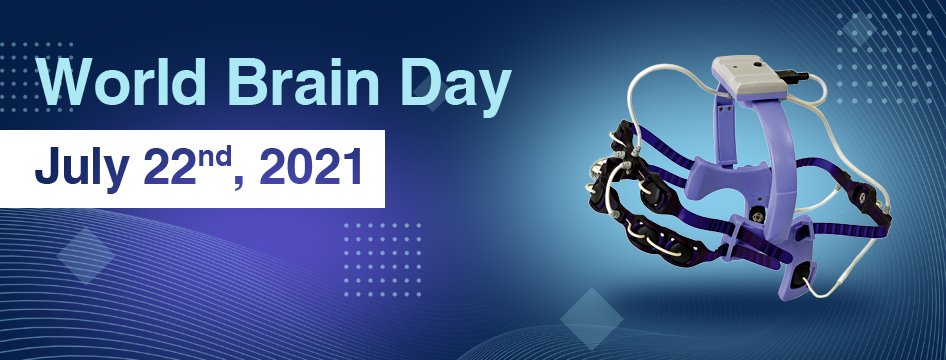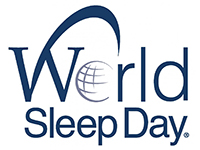Medicom MTD. Medical equipment for electrodiagnosis, rehabilitation and research
Phones: +7 (8634) 62-62-42, 62-62-43, 62-62-44, 62-62-45.
www.medicom-mtd.com
News 2021
July 22nd is World Brain Day
Its founder is the World Federation of Neurology (WFN). On July 22nd, 1957, the Federation of Neurology, an association of national neurological societies, was established, representing neurological societies in all regions of the world. The mission of the WFN is to promote the development of high-quality neurology and brain health around the world.
World Brain Day is an information and educational event dedicated to brain health.
Despite the progress of medicine, despite the scientific discoveries made in this field, including the field of brain research, the human nervous system remains an area that continues to be studied to this day. It is the brain and the multiple aspects associated with its work that is still a mystery.
Employees of our company also consider themselves involved in this event, contributing to promote awareness of brain diseases. After all, Medicom MTD Ltd has been developing and producing a wide range of electroencephalographs for studying the electrical brain activity for almost 30 years.
We wish all brain researchers вАУ users of our equipment вАУ success in a difficult but interesting professional activity, and we wish good health to their patients!
Happy World Brain Day!

World Sleep Day

World Sleep Society (WSS) celebrates World Sleep Day on Friday, March 19, 2021.
It is organized by the World Sleep Day Committee of World Sleep Society and aims to lessen the burden of sleep problems on society through better prevention and management of sleep disorders.
The slogan for the 14th annual World Sleep Day is "Regular Sleep, Healthy Future".
WSD is a call to all sleep professionals to advocate and educate the world about the importance of sleep for achieving an optimal quality of life and improve global health.
The focus on regular sleep for 2021 is based on the benefits that regular sleep offers. Studies have demonstrated that stable bedtimes and rise times are associated with better sleep quality in young, middle-aged adults, and seniors. Regular sleepers have better mood, psychomotor performance, and academic achievement.
How can we have a regular sleep? We need to remember the two processes that regulate both the timing and length of sleep: Circadian regulation (process C) and homeostatic control (process S) also known as the two-process model of sleep. Although many other factors affect sleep, such as environment, stress, and medications; understanding these two processes will help us strive towards a consistent sleep schedule.
Process C refers to our internal clock, regulated by a part of our brain called the suprachiasmatic nucleus (SCN) of the hypothalamus. This clock regulates and controls the 24-hour sleep-wake cycle via the influence of light and melatonin. In the absence of light (as during the evening hours), melatonin is produced promoting sleep but in the presence of light, the production of melatonin ceases, signaling our brain that is daytime and we need to wake up. Our behavior can override these natural signals. For instance, bright lights at night shut down the production of melatonin, delaying sleep until late hours of the night.
Process S promotes sleep based on the previous amount of time that we spent awake. During wakefulness our brain accumulates substances that promote sleep, when we sleep these substances are cleared up and we feel alert again. This process is particular important when we take naps in the afternoon, because we deplete the sleep promoting substances and we are not able to fall asleep at a reasonable time in the evening. The best sleep is when we synchronize our sleep/wake times to our internal clock and our sleep propensity finding the perfect equilibrium between process C and process S.
It is important to remember that sleep is involved with many physiologic systems such as memory consolidation, control of inflammation, hormone regulation, cardiovascular regulation and many other important functions, therefore insufficient sleep duration and poor sleep quality will be associated with several significant adverse health outcomes. Reduced sleep duration has been shown to cause impairments in cognitive and executive function, while poor sleep has been associated with poor mental health.
Based on materials from worldsleepday.org
Medicom MTD produces a wide range of equipment for professional diagnosis of sleep problems: from sleep signals recorder "ApnOx" (type III- IV AASM) to expert-class polysomnographs with synchronized video monitoring (type I-II AASM based on electroencephalographs-recorders "Encephalan-EEGR-19/26").
|
Phones: |
Frunze str., 68, Taganrog, |
| © 1997-2024 Medicom MTD Ltd All rights reserved | |
